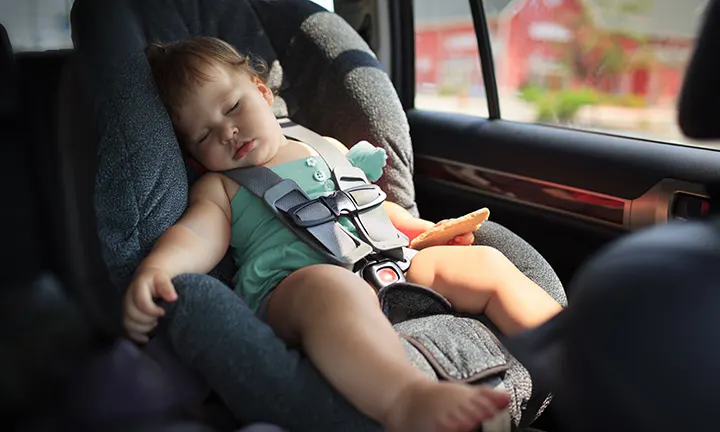Car Seat Expiration: How Long Are Car Seats Good For?
Milk expires, coupons expire, and—believe it or not—car seats expire, too. When and why do car seats expire, and how long are they good for? We’ve got all the details on this important topic, including how to find your car seat’s expiration date and what to do once it expires.
Why Do Car Seats Expire?
Perhaps it sounds odd that car seats have an expiration date, but think of them like a sturdy pair of running shoes. After so many runs, the shoe’s materials break down and don’t support your feet and movement as they should. The same happens with a car seat, which weakens over time with constant use and exposure to heat and cold. The purpose of a car seat is to keep your child safe when traveling—in the car, flying on an airplane, taking a taxi, etc. After so many uses, the materials wear down and aren’t as strong as they once were. Therefore, car seats have a specific lifespan and will eventually expire.
How Long Do Car Seats Last?
If car seats have an expiration date, what is it? Every car seat brand is different, but many manufacturers set an expiration date of six years. Therefore, you shouldn’t use or buy a car seat that’s older than six years, or one past the date specified on your particular model.
Where Is the Expiration Date on a Car Seat?
To know exactly how long car seats are good for—whether using them for infants, babies, toddlers, or older kids—you can find the expiration date for your particular model on the bottom of the seat or stamped into the plastic car seat frame. If you purchased pieces separately (such as a separate base from the car seat itself) check each piece for an expiration date, as they could be different. This information will help you make an informed decision when purchasing and using a car seat for your child.
Car Seat Expiration After an Accident
There’s one big caveat to this expiration rule: If your car seat has been in a moderate or severe car crash, it immediately expires. In fact, some manufacturers advise replacing the car seat even after a minor accident (one defined as resulting in no car damage, no injuries, and no air bags detonating). If your car sustains damage in an accident, then your car seat was likely damaged, too. With minor accidents, damage might not be noticeable to the naked eye, which is why some manufacturers recommend replacing car seats in these situations. Their mantra is, simply, it’s better to be safe than sorry. However, before running to the store to purchase a new car seat (such as the best car seats beloved by thousands of our Pampers parents), try the following:
Check the car seat for any visible damage—if there’s damage, replace it.
Check the area of the car and door nearest to the car seat for any damage—if there’s damage on the car, replace the car seat.
Call the car manufacturer with any questions. If they advise replacing the car seat, do so before traveling in the car with your child.
Ask for an expert’s help to examine the car seat.
New Vs. Used Car Seats
It’s best to always buy a new car seat, for expiration and recall purposes. With a new product, you know that it’ll keep your child safe, as it hasn’t been in an accident or recalled. However, not everyone can afford a brand-new car seat, or perhaps a trusted friend or family member is selling one that’s barely been used. It’s possible to feel confident in a used car seat, but consider the following before purchasing:
Can you trust the seller? If you’re buying a used model from a manufacturer, close friend, family member, or reputable shop, you can probably trust that it’s in good condition and safe for your baby. And if you can trust the seller, it’s possible to fully know the car seat’s history (such as whether it’s been in an accident). If you can’t confirm it hasn’t been in an accident, don’t risk it!
Does it have all the original parts? Check the car seat for any damage or missing parts, which includes all the labels, the instruction manual, and the expiration date (don’t forget to check the expiration date to make sure the seat hasn’t expired).
Has it been recalled? Check the car seat’s registration with the National Highway Traffic Safety Administration (NHTSA). You’ll be able to see if the model has been recalled—and if the previous owner registered it and reported a car accident, that could also be on the record.
What does the manufacturer say? Call the manufacturer with any questions or concerns. Although they won’t necessarily be able to physically assess the car seat, they can offer guidance and advice.
Do Car Seat Bases Expire?
When replacing your car seat, it’s important to swap the entire product. Although it’s easy to assume the plastic base may break more than the cushy seat, the entire product is susceptible to regular wear and tear or damage during a crash. Therefore, it’s important to replace both the base and seat. Of course, if you’re using a base that’s older than the seat, and you didn’t experience an accident, you can replace them separately as each piece expires. If you have any questions at all, contact the manufacturer or a CPS technician.
Do Booster Seats Expire?
Now that you know how long car seats are good for, what about booster seats—do they expire, too? The answer is yes—booster seats have an expiration date just like car seats, in that they also tend to expire after six years, but check the expiration date on your specific model to be sure. And if buying used or after a car accident, adhere to the same advice above regarding car seats. If you’re in the market for a good toddler car seat or booster seat, check out all the insider knowledge on these products contributed by Pampers Parents. Booster seats are an excellent transitional product, as they lift your child up so that the seat belt lies across the safest areas of their body (where the bones are strongest across the chest and pelvis). After your child grows out of a car seat, but before they’re big enough for a normal seatbelt, you can use a booster seat. Learn more about your baby’s growth development with our Baby Growth Calculator below.
Is it Illegal to Use an Expired Car Seat?
It isn’t safe to use an expired car seat, but is it illegal? Each state has its own set of laws and guidelines pertaining to car seats. The Department of Motor Vehicles (DMV) website in your state can detail car seat laws and guidelines, and any repercussions for violators. With some states, other governmental entities may be involved, such as the State Highway Patrol.
What to Do With Expired Car Seats
Once your car seat has expired, you’ll want to know what to do with it. It’s best to dispose of an old car seat that has reached its expiration date in a way that prevents anyone from using it in the future. Safety experts recommend taking the car seat apart and disposing of the parts separately. If you have a recycling center near you, check to see if car seat parts are accepted.
The Bottom Line
Car seats are at the top of the list of baby gear essentials. If you plan to travel in a vehicle or airplane with your child, you need one, starting with that first ride home from the hospital. However, a car seat can be a big expense. It’s tempting to avoid buying a new one but remember that car seats have an expiration date for a reason—they carry precious cargo, and a model that’s too old won’t be as safe for your little one. So, how long are car seats good for? Check your specific model’s expiration date (found under the seat or stamped onto the frame), but most manufacturers advise replacing your car seat after six years. And don’t forget that other super important baby gear travel essential: 12-hour baby-dry diapers for long road trips! Earn rewards for those endless diaper changes (whether on the road or at home) with our Pampers Club app.
How We Wrote This Article The information in this article is based on the expert advice found in trusted medical and government sources, such as the American Academy of Pediatrics and the American College of Obstetricians and Gynecologists. You can find a full list of sources used for this article below. The content on this page should not replace professional medical advice. Always consult medical professionals for full diagnosis and treatment.
Join a World of Support
through Pregnancy and Parenthood.
TRACK WITH TOOLS
LEARN WITH EXPERTS
GET REWARDED












